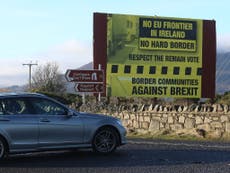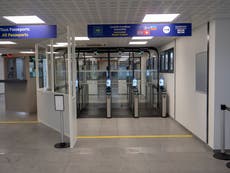Boris Johnson to meet Ursula von der Leyen for last-minute Brexit talks as EU says negotiations can continue
Pair will meet over dinner on Wednesday evening following breakthrough on Northern Ireland protocol
Your support helps us to tell the story
From reproductive rights to climate change to Big Tech, The Independent is on the ground when the story is developing. Whether it's investigating the financials of Elon Musk's pro-Trump PAC or producing our latest documentary, 'The A Word', which shines a light on the American women fighting for reproductive rights, we know how important it is to parse out the facts from the messaging.
At such a critical moment in US history, we need reporters on the ground. Your donation allows us to keep sending journalists to speak to both sides of the story.
The Independent is trusted by Americans across the entire political spectrum. And unlike many other quality news outlets, we choose not to lock Americans out of our reporting and analysis with paywalls. We believe quality journalism should be available to everyone, paid for by those who can afford it.
Your support makes all the difference.A Brexit deal on Northern Ireland has cleared the way for talks between Boris Johnson and the EU Commission president on Wednesday, as the last hope for an EU trade agreement hangs in the balance.
The prime minister will arrive in Brussels for dinner with Ursula von der Leyen in an eleventh-hour bid to unblock trade negotiations, ahead of a summit by EU leaders in the Belgian capital on Thursday.
There was goodwill evident on both sides of the Channel on Tuesday night after the UK agreed to drop controversial Northern Ireland legislation that would have broken international law, and Brussels ditched a Wednesday cut-off for pulling the plug on talks.
But it is still not clear whether the UK and EU will be able to resolve intractable issues on regulations, dispute settlement and fishing that have so far made a free-trade agreement impossible. Failure to do so is expected to cause significant economic disruption on 1 January, when Britain leaves the single market and customs union.
The EU and the UK announced in a joint statement on Tuesday that they had an agreement “in principle” on the fraught issue of the Northern Ireland border, after months of dispute about how the previous Brexit withdrawal agreement should be implemented.
The side-negotiations are separate from the stalled discussions about a free-trade agreement, but the EU had previously said the UK proceeding with its legislation to overwrite parts of the 10-month-old accord would make a trade deal impossible.
European Commission vice president Maros Sefcovic, who led joint committee negotiations on the EU side, said he hoped the deal would add momentum to trade talks, adding that the success would ensure the Northern Ireland protections negotiations last year were "fully operational as of 1 January".
Mr Gove, who led on the UK side, thanked the EU team “for their constructive and pragmatic approach” and said he would update parliament on Wednesday with more details of the as yet unseen accord.
The agreement, further details of which will be laid before parliament, concerns “practical arrangements regarding the EU’s presence in Northern Ireland”, which goods will be considered “not at risk” of smuggling, and the imposition of export and import controls.
The most controversial questions to be answered by such a deal are those of an EU presence in the territory, and whether export declarations will be required for goods travelling between Northern Ireland and Great Britain.
A joint statement on the government website said: “In view of these mutually agreed solutions, the UK will withdraw clauses 44, 45 and 47 of the UK Internal Market Bill, and not introduce any similar provisions in the Taxation Bill.”
Irish foreign minister Simon Coveney described the deal as “good progress” and said it would “finally provide some certainty on implementation of Brexit protocol in Northern Ireland”.
“Practical cooperation and flexibility has been agreed to make it as manageable as possible for people and businesses,” he said.
Under the withdrawal agreement, Northern Ireland will enforce the EU customs code, effectively putting controls on trade between the territory and Great Britain – but leaving no hard border between Ireland and Northern Ireland.
It comes as the European Commission said Brexit trade talks could continue beyond a “last-chance saloon” dinner meeting between Mr Johnson and Ms Von der Leyen slated for Wednesday.
Speaking to reporters in Brussels on Tuesday a European Commission spokesperson said the EU was willing to negotiate for “as long as necessary”.
The statement appeared to contradict comments by chief negotiator Michel Barnier, who on Monday privately told MEPs that talks would not continue past Wednesday.
“I don’t know why you had the impression that negotiations are wrapping up tomorrow,” the commission spokesperson told reporters.
“That’s not information we’ve given out. We said we were waiting for a meeting between President Von der Leyen and the prime minister of the United Kingdom in order to move forward, hopefully with negotiations, which hopefully could continue after that.”
The spokesperson said the EU was “not trying to fix down any kind of definitive framework for negotiations”, adding: “It’s not that sort of a meeting, that's not where the negotiations happen. The meeting will be to try and lift substantial impasses so that then the negotiators can continue their work.
“That’s generally how these things work. But once again it is also a meeting that is also uncharted territory when it comes to negotiations, so we're going to just have to wait and see.
“Last chance saloon or not? Quite honestly, as I said yesterday this is uncharted territory, we’ll have to see how this meeting goes. From our perceptive we continue to wish to negotiate using our mandate to do our utmost to find an reach an agreement which will allow us to defend the interests of the European Union and we will continent on that path, we are willing to continue the discussions for as long as necessary.”
Back in Westminster, the prime minister’s official spokesperson told reporters: “We have been clear that the future trading relationship needs to be concluded by the end of the year and negotiations won’t continue into next year. That has been our position throughout.”
He said that David Frost and Michel Barnier had not been negotiating on Tuesday but were preparing an “overview of the remaining differences that exist” before reporting back to Mr Johnson and Ms Von der Leyen.
The spokesperson added: “They [Frost and Barnier] will discuss and agree on the differences that remain between us. Both parties will travel back to their respective leaders today to talk them through it in advance of a face-to-face meeting in the coming days.
“The prime minister recognises that negotiators have probably taken technical talks as far as they can. We have been clear on our negotiating position around the need for any agreement to respect our sovereignty. That remains the case, but in terms of the in-person meeting, it will be to see if there is a political way through.”
Mr Johnson has no plans to meet either French president Emmanuel Macron or German chancellor Angela Merkel, said the spokesperson.
Chief EU negotiator Mr Barnier briefed EU member states on Tuesday ahead of the top-level meeting between Mr Johnson and Ms Von der Leyen. He said: “Full unity. We will never sacrifice our future for the present. Access to our market comes with conditions.”





Join our commenting forum
Join thought-provoking conversations, follow other Independent readers and see their replies
Comments